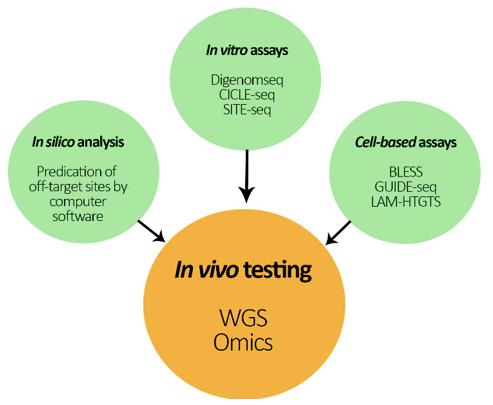Lifeasible facilitates research on gene editing for plant protection and provides services to assess the safety of gene-edited plants and other gene-edited organisms related to plant protection.
Gene editing technology can perform various functions in plant protection, including pest and disease control, weed control, and improving plant resistance. However, safety assessment of gene editing organisms is necessary based on the off-target effects, the likelihood of gene drives, and the possibility of gene spread to relatives. For example, it can be difficult to control when herbicide-tolerant genes spread to weed relatives. Conducting safety assessments to identify such situations promptly can help control risks at the source. It is more reliable to assess the safety of gene-edited organisms at multiple levels (Fig. 1). Our company provides multi-level safety assessments for plant protection-related gene-edited organisms to facilitate the application of gene editing in plant protection.
 Fig. 1 Schematic representation of the different approaches to test for unintended changes in the genome of a gene-edited organism (Agapito-Tenfen et al., 2018).
Fig. 1 Schematic representation of the different approaches to test for unintended changes in the genome of a gene-edited organism (Agapito-Tenfen et al., 2018).
We provide safety assessment services for gene-edited plants, pests, and microorganisms related to plant protection, and we provide customized safety assessments based on specific situations.
Safety assessment for gene-edited plants
We offer off-target assessment, insert gene integrity and stability assessment, and transcription stability assessment at the molecular level. Risk assessment of environmental releases of gene-edited organisms is the core and fundamental to the safety management of gene-edited organisms. We offer services to help assess the impact of transgenic plants on target and non-target organisms, the impact on biodiversity and ecosystems, and the risk of gene spreading. For gene-edited plants that will be food, we provide food safety assessments. We help detect newly produced metabolites and assess the safety of the metabolites, including toxicity evaluation and allergenicity evaluation. If nutritional-based safety needs to be determined, we can also provide that by assessing nutritional differentials between the original plants and gene-edited plants.
Safety assessment for gene-edited pests
In plant protection, gene editing for pests mostly reduces their ability to survive or reproduce. For this reason, we mainly provide off-target assessments at the molecular level and analyze the effects of gene-edited pests on their natural enemies at the environmental level.
Safety assessment for gene-edited microorganisms
For gene-edited microorganisms, we provide comprehensive safety assessments at the molecular level and environmental levels. The molecular level of safety assessment is similar to that of the gene-edited plant. For environmental safety assessments, we focus on the impact of gene editing microorganisms that express biocontrol or bioactive substances on non-target beneficial insects.
Computer-based off-target prediction
We provide an initial assessment of the safety of gene-edited organisms in the most cost-effective way. We use bioinformatic analysis to determine the off-targeting risk based on the genetic information of gene-edited organisms and their related organisms.
Target-based sequencing
We offer multiple sequencing services based on the target site or target gene to assess the integrity and stability of the target gene efficiently and to identify the new substance it may produce. In addition, we can provide multiple sequencing methods to detect off-target mutations, including GUIDE-seq, Digeneome-seq, SITE-seq, CIRCLE-seq, and DISCOVER-seq.
Omic-based comprehensive analysis
We provide genomic, proteomic, and metabolomic analyses for gene-edited plants to assess their safety fully.
Lifeasible has extensive experience not only in plant protection but also in environmental testing, food testing, and feed testing. We can help to comprehensively assess the safety of gene-edited organisms and help apply gene editing in plant protection. Please contact our technical support staff to determine the specifics of the safety assessment.
References
Lifeasible has established a one-stop service platform for plants. In addition to obtaining customized solutions for plant genetic engineering, customers can also conduct follow-up analysis and research on plants through our analysis platform. The analytical services we provide include but are not limited to the following:
Get Latest Lifeasible News and Updates Directly to Your Inbox
Adaptive Evolutionary Mechanism of Plants
February 28, 2025
Unraveling Cotton Development: Insights from Multi-Omics Studies
February 27, 2025